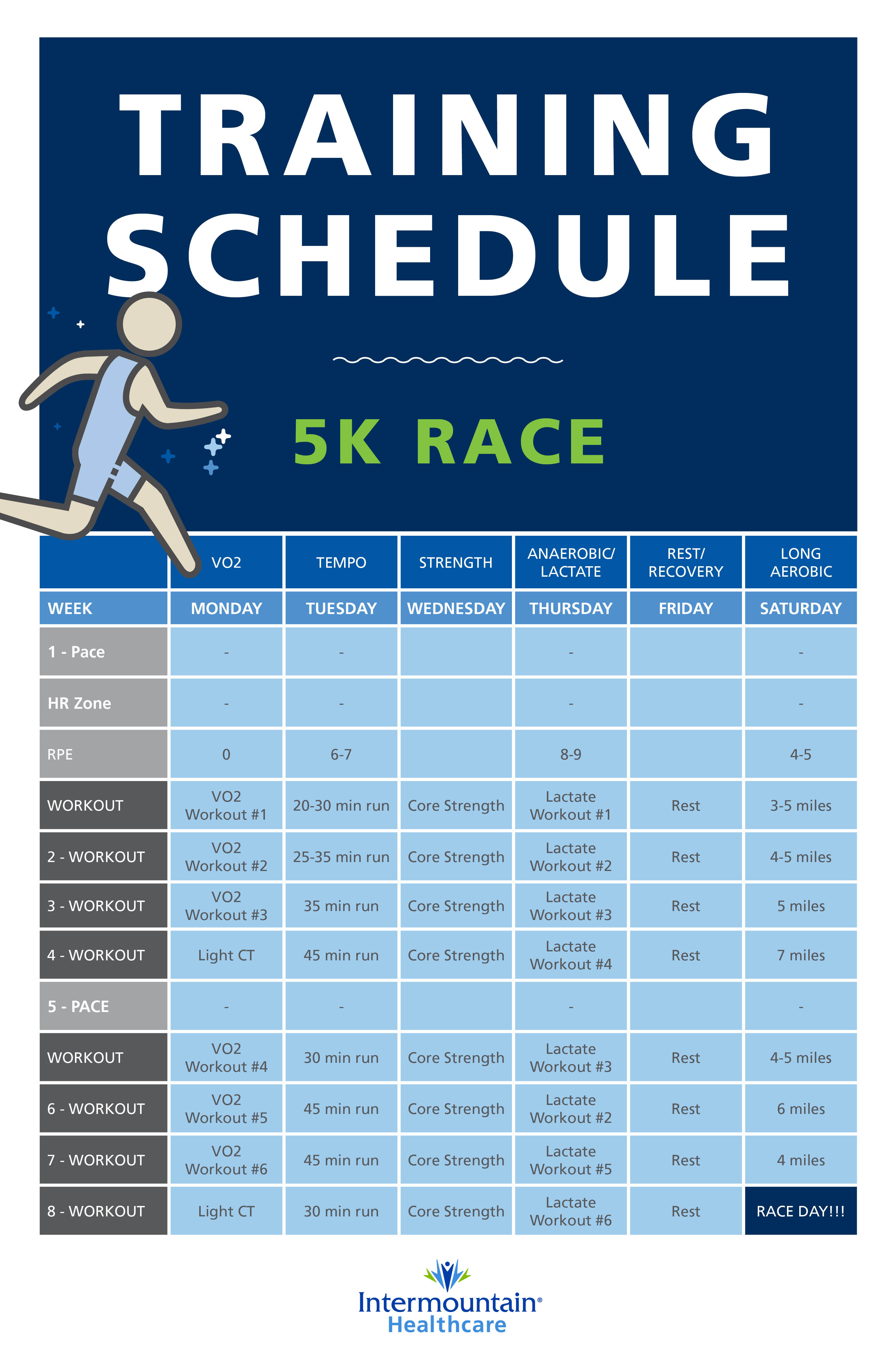How Long Is A 5K? Everything You Need To Know About Running A 5K
Running a 5K is one of the most popular fitness goals for both beginners and seasoned athletes. Whether you're training for your first race or aiming to improve your personal best, understanding the distance of a 5K is essential. This article will provide a comprehensive guide to help you grasp everything about how long a 5K is and how you can prepare for it effectively.
A 5K, short for 5 kilometers, is a widely recognized running distance across the globe. It is often the entry point for many who wish to delve into the world of competitive running. With its manageable length, it's no wonder that this distance has become so popular among runners of all levels.
In this article, we will delve into the specifics of a 5K, including its distance, how to train for it, and tips for success on race day. Whether you're a beginner or a seasoned runner, you'll find valuable information to help you achieve your fitness goals.
Read also:Did Michael J Fox Die The Truth Behind The Rumors
Table of Contents
- How Long is a 5K?
- 5K Distance in Miles
- Training for a 5K
- 5K Training Tips for Beginners
- Advanced 5K Training Techniques
- Nutrition and Hydration for a 5K
- Choosing the Right Gear for a 5K
- Race Day Preparation
- Health Benefits of Running a 5K
- Frequently Asked Questions About 5Ks
How Long is a 5K?
A 5K is exactly 5 kilometers, which translates to 5,000 meters or 3.1 miles. This distance is standardized worldwide and is recognized by the International Association of Athletics Federations (IAAF). The 5K is one of the shortest distances in road running events, making it accessible to a wide range of participants.
For those unfamiliar with metric measurements, understanding how long a 5K is in miles can help put the distance into perspective. It is slightly longer than three miles, making it a manageable yet challenging distance for runners of all levels.
Understanding the Standardization of 5K Distances
The standardization of 5K distances ensures that races held anywhere in the world adhere to the same measurement. This consistency is crucial for competitive runners who participate in events globally. Whether you're running a 5K in New York or Tokyo, the distance remains the same.
5K Distance in Miles
Converting the 5K distance to miles is essential for runners in countries that use the imperial system of measurement. A 5K is approximately 3.1 miles, making it a distance that is both challenging and achievable for most individuals.
Here’s a quick conversion table:
- 1 kilometer = 0.62 miles
- 5 kilometers = 3.1 miles
Understanding this conversion helps runners gauge their progress and set realistic goals for their training.
Read also:Unveiling The Phenomenon Mcdonalds Miku Cosplay In Pop Culture
Why Knowing the Distance in Miles Matters
For runners in the United States and other countries that primarily use miles, knowing the 5K distance in miles allows for better tracking of progress and easier communication with fellow runners. It also helps in planning training routes and setting pace goals.
Training for a 5K
Training for a 5K requires a combination of endurance, speed, and consistency. Whether you're a beginner or an experienced runner, having a structured training plan is crucial for success. A typical 5K training plan lasts between 4 to 8 weeks, depending on your current fitness level and goals.
A well-rounded training plan includes a mix of running, cross-training, and rest days. It's important to gradually increase your mileage and intensity to avoid injury and ensure steady progress.
Creating a Balanced Training Plan
A balanced training plan for a 5K should include:
- Running sessions: Incorporate a mix of easy runs, interval training, and long runs.
- Cross-training: Activities like cycling, swimming, or strength training can enhance overall fitness.
- Rest days: Allow your body to recover and repair muscles.
Consistency is key, and sticking to your training plan will help you build the endurance needed to complete a 5K successfully.
5K Training Tips for Beginners
For beginners, starting a 5K training program can seem daunting, but with the right approach, it can be an enjoyable and rewarding experience. Begin by setting realistic goals and focusing on building a strong foundation of fitness.
Start with a walk-run method, where you alternate between walking and running intervals. Gradually increase the running portions as your fitness improves. This method helps prevent injury and allows your body to adapt to the demands of running.
Essential Tips for Beginner Runners
Here are some essential tips for beginners training for a 5K:
- Set achievable goals and track your progress.
- Invest in a good pair of running shoes to support your feet.
- Listen to your body and rest when needed.
- Stay motivated by running with a friend or joining a local running group.
By following these tips, beginners can build the confidence and endurance needed to complete their first 5K.
Advanced 5K Training Techniques
For more experienced runners, advanced training techniques can help improve performance and achieve faster times. Incorporating speed work, hill training, and tempo runs into your routine can elevate your running capabilities.
Speed work involves short, intense bursts of running followed by recovery periods. Hill training builds strength and power, while tempo runs improve your ability to maintain a faster pace over longer distances.
Maximizing Performance with Advanced Techniques
To maximize performance, consider the following advanced techniques:
- Incorporate interval training to boost speed and endurance.
- Include hill workouts to strengthen your legs and improve power.
- Practice tempo runs to increase your lactate threshold.
These techniques, when combined with consistent training, can lead to significant improvements in your 5K performance.
Nutrition and Hydration for a 5K
Proper nutrition and hydration are critical components of a successful 5K training regimen. Consuming the right balance of carbohydrates, proteins, and fats can fuel your body for optimal performance. Staying hydrated is equally important, especially during intense training sessions.
Carbohydrates provide the energy needed for running, while proteins aid in muscle recovery. Healthy fats support overall health and provide long-lasting energy. Balancing these macronutrients ensures your body is well-prepared for the demands of training and racing.
Key Nutritional Tips for Runners
Here are some key nutritional tips for runners training for a 5K:
- Focus on whole, nutrient-dense foods like fruits, vegetables, and whole grains.
- Stay hydrated by drinking water throughout the day.
- Consume a balanced meal containing carbohydrates and protein before and after runs.
By prioritizing nutrition and hydration, runners can enhance their performance and recovery.
Choosing the Right Gear for a 5K
Having the right gear can make a significant difference in your 5K experience. Investing in a good pair of running shoes is essential for comfort and injury prevention. Additionally, breathable, moisture-wicking clothing can enhance your performance and keep you comfortable during the race.
Other gear to consider includes a running belt or hydration pack for carrying essentials, a GPS watch for tracking your progress, and a visor or sunglasses for protection from the elements.
Essential Gear for a Successful 5K
Here’s a list of essential gear for a 5K:
- Comfortable running shoes with proper support.
- Breathable, moisture-wicking clothing.
- A hydration pack or running belt for carrying essentials.
Choosing the right gear can enhance your running experience and contribute to a successful race day.
Race Day Preparation
Proper preparation is key to a successful race day. Arrive early to avoid stress and give yourself time to warm up. Follow your pre-race routine, which may include a light meal, hydration, and dynamic stretching.
During the race, focus on maintaining a consistent pace and staying hydrated. Listen to your body and adjust your pace if needed. After crossing the finish line, take time to cool down and celebrate your accomplishment.
Top Tips for Race Day Success
Here are some top tips for a successful race day:
- Arrive early and follow your pre-race routine.
- Stay hydrated and maintain a steady pace throughout the race.
- Celebrate your achievement and take time to recover after the race.
With proper preparation, you can enjoy a successful and fulfilling race day experience.
Health Benefits of Running a 5K
Running a 5K offers numerous health benefits beyond just physical fitness. It improves cardiovascular health, strengthens muscles, and enhances mental well-being. Regular running can also contribute to weight management and reduce the risk of chronic diseases.
Mentally, running a 5K can boost self-esteem, reduce stress, and improve cognitive function. The sense of accomplishment gained from completing a race can be incredibly rewarding and motivating for future fitness endeavors.
How Running a 5K Improves Overall Health
Running a 5K can improve overall health in the following ways:
- Enhances cardiovascular health and endurance.
- Strengthens muscles and improves flexibility.
- Boosts mental well-being and reduces stress.
By incorporating regular running into your routine, you can enjoy these health benefits and more.
Frequently Asked Questions About 5Ks
Q: How long does it take to train for a 5K?
A: Training for a 5K typically takes between 4 to 8 weeks, depending on your current fitness level and goals.
Q: What is the average time to complete a 5K?
A: The average time to complete a 5K varies based on factors like age, fitness level, and experience. A typical time for beginners is around 30 minutes, while experienced runners may complete it in under 20 minutes.
Q: Is running a 5K good for weight loss?
A: Yes, running a 5K can contribute to weight loss by burning calories and improving metabolism. Combining regular running with a healthy diet can enhance weight loss efforts.
Final Thoughts
Running a 5K is an achievable and rewarding goal for runners of all levels. By understanding the distance, training effectively, and preparing adequately, you can enjoy a successful and fulfilling race day experience.
In conclusion, remember to:
- Set realistic goals and track your progress.
- Follow a balanced training plan and prioritize nutrition and hydration.
- Choose the right gear and prepare thoroughly for race day.
Take action today by starting your training and sharing your journey with fellow runners. Together, we can achieve our fitness goals and enjoy the many benefits of running a 5K. Don't forget to leave a comment or share this article with others who may find it helpful. Happy running!


